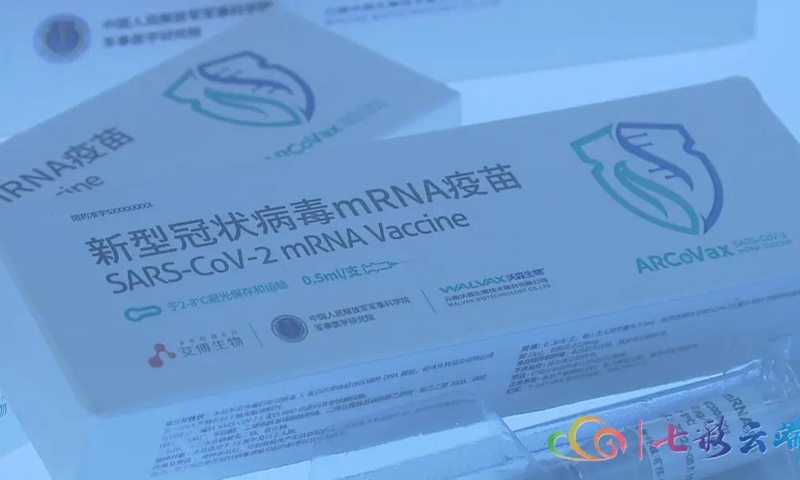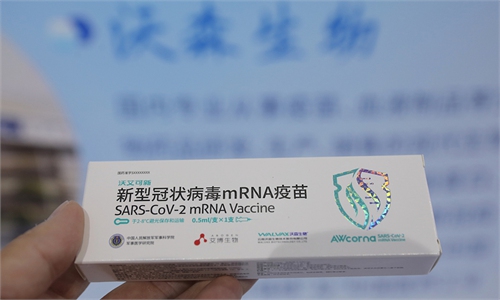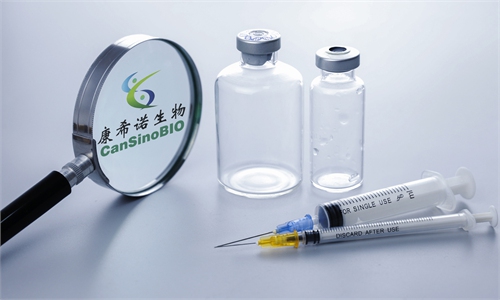'Effective' mRNA vaccines approved for clinical trials, key to building immune barrier
New tech to cope with more dangerous mutations, other potential infectious diseases

mRNA vaccine photo:Web
The research and development (R&D) of more COVID-19 vaccines with good protection rates is key for China to further build up an effective immune barrier, which is also seen as a must for future adjustment of anti-epidemic measures, Chinese immunologists said on Tuesday, after two home-grown vaccines based on mRNA technology were approved for clinical trials.
Chinese vaccine developer CanSinoBIO's COVID-19 mRNA vaccine has received approval from the National Medical Products Administration for clinical trial applications in China, the company announced in a news release on Monday.
On Sunday, Hebei Province-based CSPC Pharmaceutical Group said its mRNA COVID-19 vaccine candidate, called SYS6006, has also been cleared for clinical trials.
Feng Duojia, President of the China Vaccine Industry Association, told the Global Times on Tuesday that it is a good news that more Chinese vaccine producers are working on the R&D of mRNA vaccines, a new technology that is essential to cope with more dangerous mutations of the coronavirus in the future, as well as other potential infectious disease.
Feng said some seven or eight Chinese vaccine producers are working on the mRNA vaccines. Companies including Walvax Biotechnology and Stemirna Therapeutics are launching clinical trials.
Challenged by the Omicron variant, which has been spreading rampantly in China affecting some 29 provincial-level regions, China encourages the production of any vaccines that are safe, effective and accessible, Shao Yiming, a leading virologist and immunologist from the Chinese Center for Disease Control and Prevention (China CDC), told the Global Times on Tuesday.
Shao noted that the layout to develop effective home-grown mRNA vaccines fulfills China's practical needs.
Despite higher rates of side effects after injections, such as fever or allergic reactions, data showed mRNA vaccines could generate high levels of protection against mild cases of COVID-19, even though their protection against severe and fatal cases is similar to those of inactivated vaccines. So, in hard-hit areas, the risk-benefit ratios suggest that people should get mRNA vaccines, Shao noted.
It is technically easy and takes a shorter period to develop, and it is easy to upgrade based on any emerging variant, Shao said.
The mRNA vaccines developed by Chinese companies are not much different from those made by overseas producers. But restricted by technical bottleneck problems such as raw and auxiliary materials and key equipment, R&D of domestic mRNA vaccines has been slow, and they are mostly still in phase I or phase II clinical trials, Feng noted.
The lack of vaccine subjects in the country to participate in clinical trials of mRNA vaccines is another reason slowing down China's mRNA vaccine R&D, immunologists said. More than 90.63 percent of the Chinese population has been fully vaccinated, most with inactivated vaccines.
Lu Hongzhou from the National Clinical Research Center for Infectious Diseases, affiliated with the Third People's Hospital of Shenzhen, also suggested widening the use of vaccines, especially the R&D of mRNA vaccines, in the face of the Omicron variant onslaught.
A booster of an inactivated vaccine displayed very limited neutralizing activity against the Omicron variant and its neutralizing activity was significantly lower than that of a heterologous booster or mRNA vaccine alone, Lu told the Global Times.
If domestic mRNA vaccines - which have proved effective in restoring or leveling up the efficacy of vaccines when used as booster shots - are accessible to Chinese, it will facilitate the country to build stronger immunological barrier. An effective immune barrier against COVID-19 is one of the conditions for the country to adjust the current strict epidemic prevention and control measures, Lu said.
The bottom line for the country to adjust its epidemic prevention and control strategy is to prevent large-scale infections, deaths and the overwhelming of medical resources, Zhang Wenhong, a respected infectious disease expert in Shanghai said earlier, highlighting the importance of vaccines.
A Jilin Province-based vaccine expert told the Global Times on Tuesday he recommended the fast application of mRNA vaccines for elderly people who haven't received any vaccines to make up for the shortfalls for the country to build a strong immunological barrier.
The insufficient percentage of booster shots among elderly Chinese people, who are most vulnerable, is the weak link of our country in the battle against COVID-19 and current vaccination efforts are focusing on increasing booster shots for people over 80 years old, Shao said.
A total of 694.93 million people received a booster shot in China, among whom 17.3 million received a combined booster shot, data provided by the National Health Commission on April 1 showed.
Shao noted that the side effects of the vaccines based on mRNA, a pretty new technology that only began to be put into human use on a large scale because of COVID-19, cannot be ignored. Its long-term safety should be further confirmed after closely monitoring adverse events following immunization in humans for years.
Shao also recommended people to receive booster shots available in their regions to increase their immunity against COVID-19.
The latest study of the University of Hong Kong revealed that the protection rate against death or severe illness generated after three shots of Sinovac's inactivated vaccine and three shots of BioNTech mRNA's vaccine are all above 98 percent in people aged 60 and above.



